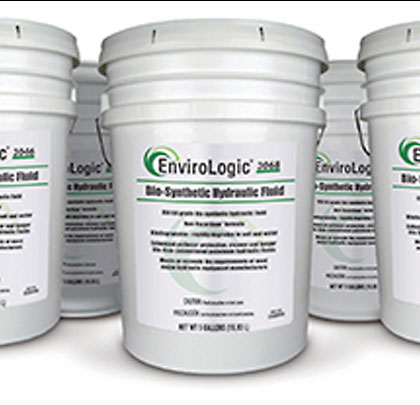Performance and sustainability—two words with growing importance in the construction industry. Performance is a must-have to complete any job effectively, efficiently, on-time, and on-budget, while regulatory oversight of projects and greater corporate understanding is providing an opportunity for enhanced sustainability. From engine technology and alternative fuels down to functional fluids and cleaners, construction contractors are seeing the convergence of performance and sustainability. The use of readily biodegradable, biobased hydraulic fluids in place of traditional petroleum-based fluids is becoming more widespread in the construction industry.
SUSTAINABLE FLUIDS DEFINED
With the advance of sustainable operations, many products claim to be “green” in an attempt to capture companies’ attention and take advantage of their legitimate corporate desire to reduce their impact on the environment. Many of these products fall short, both on performance and true sustainability.
For a product to be biobased, the materials or chemicals used must be derived from renewable biological resources—often plants. By using naturally occurring materials and chemicals, products are able to more easily return to their natural state through degradation. In contrast, petroleum-based products are derived from non-renewable resources as there is a finite amount of those global resources. The U.S. Department of Agriculture (USDA) even recognizes products that meet its BioPreferred program standards. The program is intended to promote the increased purchase and use of biobased products.
In terms of biodegradation, claiming a product is biodegradable means next to nothing in terms of its realistic impact on the environment. Many people often say a product or substance is biodegradable, thinking that such a term indicates it is less damaging to the environment, but in fact, oil and other potentially harmful things for the environment are biodegradable too—just after a long period of time.
Biodegradation occurs when a given substance or fluid’s chemical bond weakens and breaks. In some cases, potentially toxic residue may persist in the environment after the biodegradation of petroleum derived fluids.
There are technical terms, like inherently biodegradable and readily biodegradable, to describe the rate at which a substance or a fluid degrades and is recognized as a food source by the natural environment. That rate of biodegradation is driven by a number of factors, including the makeup of those original chemical bonds, the temperatures that the substance is being exposed to, the availability of natural enzymes to consume the remains as food, and the presence of water and oxygen. All of these factors need to be present in order for biodegradation to occur.
Readily biodegradable specifically defines a substance, fluid, or composition that will degrade 60 percent or greater within 28 days or less. There are several internationally recognized ASTM tests that confirm this characteristic of a given product and allow companies to back up a readily biodegradable claim. In fact, the Federal Trade Commission (FTC) even requires companies who use the term readily biodegradable in describing their products to state the test (for example, “ASTM 5864 compliant”) in validation of the claim.
While the Federal Trade Commission has protections and guidelines in place to help construction companies and prevent suppliers from “green washing” their products, it is critical that the construction industry understand the basics of biodegradation when dealing with hydraulic fluids, degreasers, and other similar products. Asking the right questions upfront ensures that when spills occur and remediation is needed, the company understands the full implications and reduced effect their products will have on the environment.
PERFORMANCE FLUIDS IN ACTION
From a performance standpoint, many of these eco-friendly products, legitimate or not, in the industry have not fared well in the past. These fluids or degreasers provided a trade-off between performance and sustainability. That trade-off has been eliminated by some companies, who are now able to produced readily biodegradable, biobased products that match or, in some cases, even exceed the performance of their petroleum-based counterparts in viscosity range and wear performance. Equipment manufacturers and hydraulic suppliers continue to give approval to these products because they meet the equipment performance standards.
For example, the EnviroLogic® 3000 series from RSC Bio Solutions is a high-performance line of readily biodegradable, non-hazardous hydraulic fluids. These products can perform across wide temperatures ranging from -40 degrees F to 250 degrees F and up to 5000+ psi. With the ability to work in extreme temperatures, seasonal changeovers can be minimized. The EnviroLogic 3000 series of products are ideal for mobile hydraulic systems operating in environmentally sensitive areas. These products allow construction contractors to maintain or improve their performance levels with the added benefit of a safer, more sustainable product.
BOTTOM-LINE BENEFITS
Readily biodegradable, biobased fluids and cleaners deliver both performance and sustainability—attributes that contribute to any company’s bottom line. These products are able to reduce the workplace hazards and environmental risks associated with spills or leaks that can not only tarnish a company’s reputation, but also lead to costly remediation involving cleanup, potential regulatory fines, and equipment or employee downtime. Spills of readily biodegradable products are often viewed by regulatory agencies differently than petroleum-based spills, and this effect can positively impact a company’s spill response, costs, and ultimately operational productivity.
As the construction industry pursues greater profitability, companies should consider every part of their operation as an opportunity for analysis and improvement. Hydraulic fluids and degreasers are one of those areas, and readily biodegradable products stand ready to deliver those two key words that go straight to the bottom line—performance and sustainability. ■
About The Author:
Lisa Owen is vice president of business development and marketing with RSC Bio Solutions, an affiliate of RSC Chemical Solutions focused on providing high-performance chemistries that are safer, non-hazardous, and environmentally responsible. For more information, visit www.rscbio.com. EnviroLogic® is a registered trademark of Terresolve Technologies, Ltd. Terresolve Technologies, Ltd. DBA RSC Bio Solutions.
_________________________________________________________________________
Modern Contractor Solutions, August 2013
Did you enjoy this article?
Subscribe to the FREE Digital Edition of Modern Contractor Solutions magazine.

Readily Biodegradable Fluids


